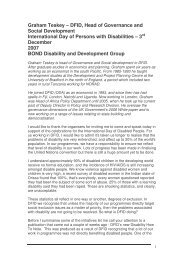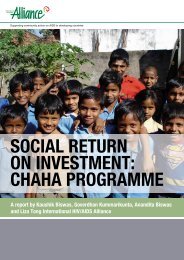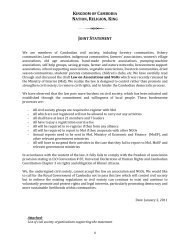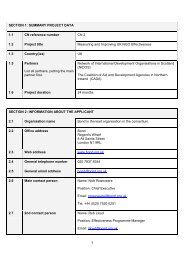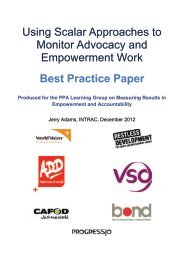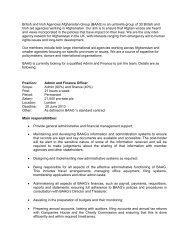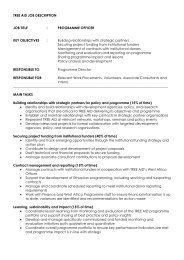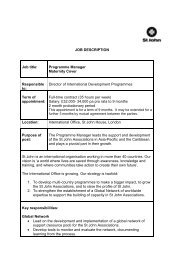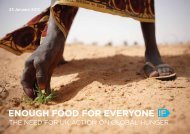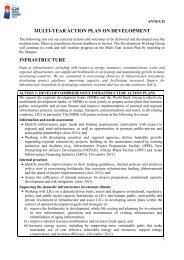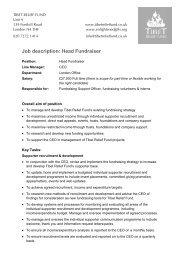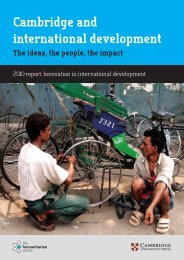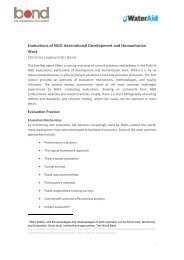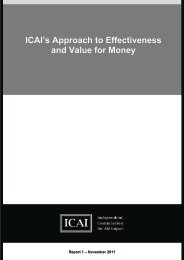Here - Bond
Here - Bond
Here - Bond
- No tags were found...
You also want an ePaper? Increase the reach of your titles
YUMPU automatically turns print PDFs into web optimized ePapers that Google loves.
32EFFECTIVENeSS | Why use the EvidencePrinciples?EFFECTIVENeSS | Strengtheningevidence and results in DFID33Why use the EvidencePrinciples? cont…I would like to see some agreement betweendonors whereby evidence based on thesePrinciples was considered good enough.The Principlesshow us the‘gold’ standardWilm van Bekkum, Self Help AfricaEnd of project evaluations byindependent local consultants oftenlack robust and rigorous evidence,despite the DAC criteria. This cancause real difficulties when it comes todemonstrating our impact to funders,beneficiaries and within ourorganisation.The <strong>Bond</strong> Evidence Principlesprovide concrete and thoroughguidance for assessing the quality ofevidence. These are the first sectorwidecommon principles that enableall organisations to check that theyare covering what’s important. Theyalso highlight areas where evidencemight be missing. The guidance isparticularly useful for smaller NGOsthat have less dedicated monitoringand evaluation expertise andresources than larger NGOs with aspecialised M&E department.The Principles can be used todevelop terms of reference for end ofproject evaluations, reviewingevaluation and monitoring reports,baseline surveys and monitoringsystems in general. The Principlesshow us what the ‘gold’ standard (level4) is but there’s no expectation that wemust reach it immediately. I would behappy for Self Help Africa to reach thefirst level for all the principles to beginwith and then aim to improve overthe next two to three years. That bothDFID and Comic Relief areenthusiastic adds real weight and Iwould like to see some agreementbetween donors whereby evidencebased on these Principles wasconsidered good enough.Piloting the principlesSelf Help AfricaThe pilot phase of the EvidencePrinciples is an excellent opportunityto share experiences with otherpeople, get advice from peers andimprove your monitoring andevaluation systems in a reliable andsupportive way. Your confidence willgrow, knowing that you can meetparticular criteria and respond robustlyto questions and requests from donors.Of course, every organisation hastheir own systems but for me, sharingideas and experience with peopledoing similar work in otherorganisations is a vital component oflearning and improvement.A value formoneyassessmentAngela Kellett, Evidence andAccountability Manager,World Vision UKThere is increasing pressure todemonstrate the impact aid is havingon the world's poorest and mostmarginalised people. A particularchallenge of the results and evidenceagenda is the ability to demonstrateimpact of effective approaches whereresults are high but are long-term bynature.Our approach todemonstrating resultsWorld Vision's 'Citizen voice and Action'approach through social accountabilitymechanisms are part of a complexresults chain, embedded in a broadtheory of change where results areharder to measure in the short term butevidence shows that impact will be highand sustained.We have taken strides to develop thequality of our results throughstrengthening all stages of project andprogramme cycles with a particularemphasis on robust baselines, reviewsand evaluations. We seek to clearlydemonstrate the change withincommunities and the contribution tothe change identified with a particularfocus on communities assessing,analysing and validating the impact.Channarith is a youth advocate workingin his community as a peer educator.Vichheka Sok/World Vision 2012World Vision has developed a global setof approaches, based on industrystandards (where they exist) to buildan evidence base that assesses theireffectiveness and appropriateness togeneralise across countries andcontexts, and a global set of childwellbeing outcomes with an associatedlist of indicators to enable national andglobal analysis of results.A critical review ofevidenceWe have been actively involved in thedesign and piloting of the <strong>Bond</strong>Evidence Principles and are currentlyusing them to assess all evaluationsthat will be used to inform the annualimpact report. A peer agency has agreedThe Principles have enabled usto critically review how robustour evidence is against industryagreed standards and identifycommon areas of weaknessthat need addressing.to perform a random sample review ofour assessment of the quality ofevidence before the report is published.The Principles have been an excellentresource to enable us to critically reviewhow robust our evidence is againstindustry agreed standards and identifycommon areas of weakness that needaddressing. Moreover, the Principlesenable the assessment of quality andapplicability of evidence against thecost of generating that evidence toenable a value for money assessment tobe performed on the cost versus benefitof different assessment approaches.We are committed to seeing thePrinciples utilised by the sector toenhance learning and supportconstructive dialogue between civilsociety NGOs, partners and donors asto what constitutes robust evidence ofeffectiveness and what is good enough.Strengtheningevidence andresults in DFIDDFID is investing more systematicallyin research and evidence in order tocapture the results and value for moneyof its programmes. This reflects agrowing emphasis across UKgovernment on evidence-based policyand demand from DFID ministers forbetter evidence to inform policies andprogrammes. Through its Researchand Evidence Division (RED) DFID hasincreased spending on research and israising the standards of evidence andquality of evaluation across itsprogrammes. This is a similar trendamong other funders, both officialdonors and private foundations. <strong>Bond</strong>’snew evidence initiative for UK NGOs isparticularly welcome in this regard.DFID is commissioning a set ofrigorous evidence products thatinclude evidence papers, systematicreviews, literature reviews, and rapidreviews. The Evidence into Actionteam in RED is responsible fordeveloping these products andsponsoring uptake of research fundedby DFID. RED is presently developinga common set of standards based onestablished frameworks for assessingresearch quality to inform thepreparation of evidence products andbusiness cases.DFID’s Civil Society Department(CSD) seeks to capture thecontribution that CSOs make todevelopment, to share evidence thatcan inform policy making, and mostimportantly to better understand howthe interventions we support helppoor people. We may not know forsure that CSOs consistently performbetter than others in achievingoutcomes for poor people, but we doknow that they have a distinctive roleto play through their reach, outreachand voice.CSD welcomes the opportunityto support the sector to articulaterobustly its contribution to globalpoverty reduction through theDFID-funded <strong>Bond</strong> EffectivenessProgramme and the ProgrammePartnership Agreement (PPA)Learning Partnership. It is an area weall struggle with, but we are keen topromote mutual learning about resultsand evidence.CSD is therefore activelyparticipating in the pilot of the <strong>Bond</strong>Evidence Principles. We are using thePrinciples to inform our assessmentsof the recent Independent ProgressReviews submitted by PPA grantees,and we are exploring with our fundmanagers how to pilot them throughthe Governance and TransparencyFund. We are also encouraging ourPPA grantees to pilot the Principlesthough the Learning Partnership,and are encouraged by the responseso far – and that this responseincludes partners based in the south.We encourage CSOsto participate in thepilot of the <strong>Bond</strong>Evidence Principles.We will be feeding back our ownexperience through the pilot. Wewould like to encourage an increasingnumber of CSOs to participate in thepilot to ensure that the final Principlesare as relevant, as useful and as realisticas possible. Together we hope toenhance and strengthen the way thevaluable contribution CSOs make todevelopment is captured, assessed andreported.Mark Robinson, Chief ProfessionalOfficer, Governance, SocialDevelopment, Conflict andHumanitarian, and Julia Chambers,Social Development Adviser, DFIDthe networker 103 | January – March 2013 bond.org.ukbond.org.ukthe networker 103 | January – March 2013



